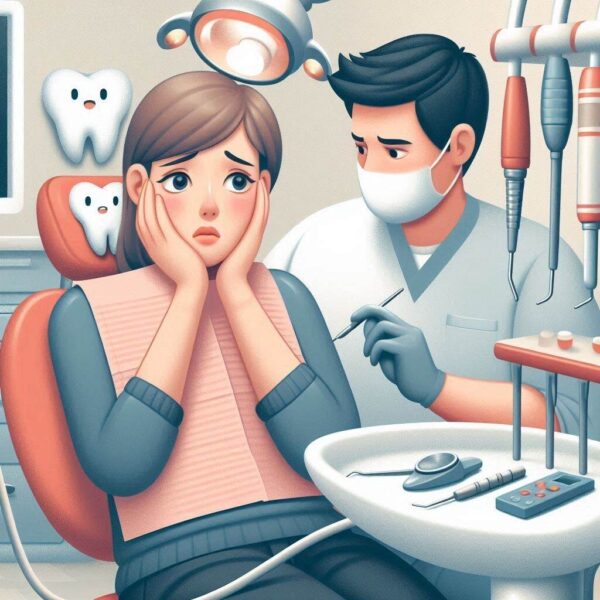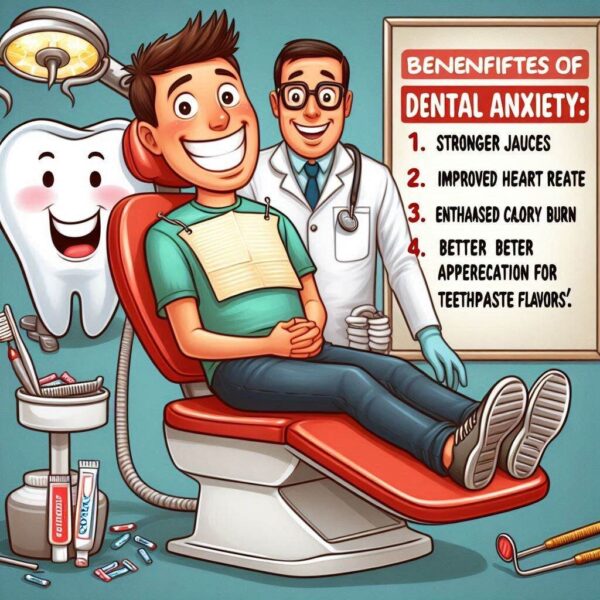
Dental anxiety is a common issue that affects many individuals, often stemming from fear or apprehension about dental procedures, equipment, or past negative experiences.
This anxiety can lead to avoidance of dental visits, resulting in compromised oral health. However, by implementing effective management strategies, individuals can overcome their fears and comfortably receive the dental care they need.
From relaxation techniques to communication with dental professionals, various approaches exist to help alleviate dental anxiety and promote a positive dental experience.
In this guide, we explore methods for managing dental anxiety to empower individuals to prioritize their oral health without fear or discomfort.
How To Manage Dental Anxiety

Managing Dental Anxiety: Overcoming Fear of the Dentist
Dental anxiety, characterized by feelings of fear, apprehension, or stress related to dental visits, is a common issue that affects many individuals.
This anxiety can stem from various factors, including fear of pain, needles, drills, or past traumatic experiences. However, managing dental anxiety is essential for maintaining good oral health and preventing dental problems from worsening due to avoidance of necessary treatment.
Here are some effective strategies for managing dental anxiety and promoting a positive dental experience:
1. Open Communication
Discuss Your Concerns:
Communicate openly with your dentist about your fears and concerns regarding dental treatment. A compassionate and understanding dentist can provide reassurance and tailor treatment approaches to accommodate your needs.
Ask Questions:
Ask your dentist to explain each step of the dental procedure in detail, including any potential discomfort or sensations you may experience. Understanding what to expect can help alleviate anxiety.
2. Relaxation Techniques
Deep Breathing:
Practice deep breathing exercises before and during dental appointments to help calm your nerves and reduce stress. Inhale deeply through your nose, hold for a few seconds, and exhale slowly through your mouth.
Progressive Muscle Relaxation:
Engage in progressive muscle relaxation techniques by tensing and then relaxing different muscle groups in your body, starting from your toes and working your way up to your head.
3. Distraction Techniques
Listening to Music:
Bring headphones and listen to calming music or an audiobook during dental procedures to distract yourself from dental sounds and sensations.
Visualization:
Use visualization techniques to imagine yourself in a peaceful and relaxing environment, such as a tranquil beach or a serene forest, while undergoing dental treatment.
4. Desensitization
Gradual Exposure:
Gradually expose yourself to dental settings and procedures by scheduling shorter appointments or visiting the dental office without undergoing treatment initially. Over time, gradually increase the duration and complexity of dental visits as you become more comfortable.
5. Sedation Dentistry
Sedative Options:
Explore sedation dentistry options with your dentist, such as nitrous oxide (laughing gas), oral sedatives, or intravenous (IV) sedation, to help you relax during dental procedures. These sedatives can induce feelings of calmness and relaxation while still allowing you to remain conscious.
6. Find a Supportive Dentist
Seek a Dentist Who Specializes in Anxiety Management:
Look for a dentist who specializes in treating patients with dental anxiety or offers amenities such as calming environments, distraction techniques, and sedation options to help manage anxiety. I hope now you are fully aware of How to manage dental anxiety.
What Is Dental Anxiety

Understanding Dental Anxiety
Dental anxiety refers to feelings of fear, nervousness, or apprehension experienced by individuals in anticipation of dental visits or procedures. It is a common issue that can vary in severity from mild discomfort to debilitating phobia. Dental anxiety may stem from various factors, including:
1. Fear of Pain
Anticipation of Discomfort:
Many individuals associate dental procedures with pain or discomfort, leading to anxiety about potential sensations during treatment.
2. Fear of Needles and Instruments
Dental Equipment:
The sight and sound of dental instruments, such as drills or needles, can trigger anxiety in some individuals due to their association with discomfort or past negative experiences.
3. Previous Traumatic Experiences
Negative Memories:
Past traumatic experiences, such as painful dental procedures or feelings of loss of control, can contribute to the development of dental anxiety.
4. Loss of Control
Feeling Vulnerable:
Sitting in the dental chair and relinquishing control to the dentist can evoke feelings of vulnerability and anxiety for some individuals.
5. Embarrassment or Shame
Dental Appearance:
Concerns about the appearance of one’s teeth or fear of being judged by dental professionals can exacerbate feelings of embarrassment or shame, contributing to dental anxiety.
6. Lack of Trust
Trust in Dentist:
Lack of trust in dental professionals or uncertainty about the outcome of dental treatment can increase anxiety levels.
7. Generalized Anxiety Disorder
Underlying Anxiety:
For individuals with generalized anxiety disorder or other mental health conditions, dental anxiety may be part of a broader pattern of anxiety-related symptoms.
Is Dental Anxiety Important?

Dental anxiety is indeed significant, as it can have profound effects on an individual’s oral health, overall well-being, and quality of life. Here’s why dental anxiety is important to address:
1. Impacts Oral Health
Avoidance of Dental Care:
Dental anxiety often leads to avoidance of dental visits and necessary treatment, resulting in untreated dental issues, such as cavities, gum disease, and tooth decay, which can worsen over time.
Poor Oral Hygiene:
Individuals with dental anxiety may neglect oral hygiene practices, such as brushing and flossing regularly, further increasing the risk of dental problems.
2. Affects Overall Well-Being
Psychological Distress:
Dental anxiety can cause significant psychological distress, including feelings of fear, apprehension, and embarrassment, negatively impacting overall well-being and quality of life.
Avoidance Behavior:
The fear of dental visits and procedures may extend beyond oral health concerns, leading to avoidance behavior in other areas of life and hindering social interactions and daily activities.
3. Contributes to Dental Phobia
Progression to Phobia:
Untreated dental anxiety can escalate into dental phobia, a severe and debilitating fear of dental treatment, making it even more challenging to seek and receive necessary dental care.
4. Hinders Professional Relationships
Trust in Dentists:
Dental anxiety may erode trust in dental professionals, hindering the establishment of positive relationships and effective communication between patients and dentists.
What Are The Benefits Of Dental Anxiety

While dental anxiety itself is not inherently beneficial, addressing and managing dental anxiety can lead to several positive outcomes for individuals. Here are some potential benefits:
Benefits of Addressing Dental Anxiety
1. Improved Oral Health
Regular Dental Visits:
By overcoming dental anxiety, individuals are more likely to attend regular dental check-ups and seek necessary treatment, leading to improved oral health outcomes.
Preventive Care:
Addressing dental anxiety encourages individuals to prioritize preventive dental care, such as cleanings and exams, reducing the risk of dental problems and complications.
2. Reduced Psychological Distress
Enhanced Well-Being:
Managing dental anxiety alleviates psychological distress associated with dental visits, leading to improved overall well-being and quality of life.
Increased Confidence:
Overcoming dental anxiety boosts self-confidence and self-esteem, empowering individuals to take control of their oral health and seek dental care without fear or hesitation.
3. Positive Dental Experiences
Building Trust:
Effective management of dental anxiety fosters positive relationships between patients and dental professionals, built on trust, respect, and open communication.
Comfortable Treatment:
By addressing dental anxiety, individuals can undergo dental procedures in a comfortable and relaxed manner, enhancing the overall dental experience.
4. Prevention of Dental Phobia
Early Intervention:
Addressing dental anxiety early on prevents its progression into a dental phobia, a more severe and debilitating condition that significantly impacts dental care access and outcomes.
Greater Treatment Success:
By managing dental anxiety proactively, individuals can receive necessary dental treatment with greater success and effectiveness, preventing dental problems from worsening.
How Common Is Dental Anxiety?

Prevalence of Dental Anxiety
Dental anxiety is a widespread phenomenon that affects a significant portion of the population worldwide. Here’s a closer look at its prevalence:
1. Global Impact
Common Condition:
Dental anxiety is one of the most common types of anxiety disorders, affecting individuals of all ages, genders, and backgrounds.
Global Estimates:
Research suggests that dental anxiety affects approximately 5% to 20% of the global population, with variations depending on geographical location, cultural factors, and socioeconomic status.
2. Age Groups
Children and Adolescents:
Dental anxiety is prevalent among children and adolescents, with studies indicating that up to 20% of young individuals experience moderate to severe dental anxiety.
Adults:
Dental anxiety remains prevalent among adults, with estimates suggesting that approximately 10% to 15% of adults experience significant dental anxiety that affects their willingness to seek dental care.
3. Contributing Factors
Past Experiences:
Negative past experiences, such as painful or traumatic dental procedures, contribute to the development and persistence of dental anxiety in individuals of all ages.
Fear of Pain:
Fear of pain and discomfort associated with dental procedures is a primary driver of dental anxiety, leading individuals to avoid dental visits and treatment.
Dental Phobia:
In severe cases, dental anxiety may progress to dental phobia, a debilitating fear of dental treatment that significantly impairs oral health and quality of life
What Can You Do To Relieve Anxiety?

Strategies to Relieve Anxiety
Managing and relieving anxiety involves adopting various techniques and approaches to promote relaxation and reduce stress levels. Here are some effective strategies:
1. Deep Breathing
Diaphragmatic Breathing:
Practice deep breathing exercises, such as diaphragmatic breathing, to promote relaxation and reduce physiological arousal associated with anxiety.
Belly Breathing:
Inhale deeply through your nose, allowing your abdomen to expand, and exhale slowly through your mouth, focusing on releasing tension with each breath.
2. Progressive Muscle Relaxation (PMR)
Tension and Release:
Engage in progressive muscle relaxation techniques, systematically tensing and then relaxing different muscle groups in your body to promote physical and mental relaxation.
Guided PMR:
Use guided progressive muscle relaxation recordings or apps to assist you in the process, guiding you through each muscle group for optimal relaxation.
3. Mindfulness Meditation
Present Moment Awareness:
Practice mindfulness meditation to cultivate present-moment awareness and non-judgmental acceptance of your thoughts, feelings, and bodily sensations.
Mindful Breathing:
Focus on your breath as it moves in and out of your body, anchoring your attention to the present moment and promoting a sense of calmness and inner peace.
4. Guided Imagery
Visualization Techniques:
Engage in guided imagery or visualization exercises, imagining yourself in a peaceful and serene environment, such as a tranquil beach or a lush forest, to promote relaxation and reduce anxiety.
Positive Affirmations:
Incorporate positive affirmations or mantras into your guided imagery practice, reinforcing feelings of self-confidence, calmness, and empowerment.
5. Physical Activity
Exercise Regularly:
Engage in regular physical activity, such as walking, jogging, yoga, or tai chi, to release endorphins, reduce stress hormones, and promote overall well-being.
Mind-Body Connection:
Explore mind-body exercises, such as yoga or qigong, which combine physical movement with mindfulness and breath awareness to promote relaxation and stress relief.
6. Social Support
Connect with Others:
Seek social support from friends, family members, or support groups to share your feelings and experiences, receive encouragement, and gain perspective on managing anxiety.
Professional Help:
Consider seeking support from a mental health professional, such as a therapist or counselor, who can provide guidance, coping strategies, and therapeutic interventions tailored to your specific needs.
Conclusion
Managing dental anxiety is essential for ensuring access to timely dental care, maintaining good oral health, and promoting overall well-being.
By implementing effective strategies such as deep breathing, progressive muscle relaxation, mindfulness meditation, guided imagery, physical activity, and social support, individuals can alleviate anxiety and foster a positive dental experience.
It’s important to recognize that managing dental anxiety is a journey that may require experimentation and persistence to find what works best for each individual.
Seeking support from dental professionals trained in anxiety management techniques and mental health professionals can provide valuable guidance and support in navigating dental anxiety.
With proactive management and support, individuals can overcome their fears and prioritize their oral health with confidence and empowerment. I hope now you understand fully about How to manage dental anxiety.
FAQs: How to Manage Dental Anxiety
Q1. What are some relaxation techniques for managing dental anxiety?
A1. Deep Breathing:
Practice deep breathing exercises to promote relaxation and reduce stress levels.
Progressive Muscle Relaxation (PMR):
Engage in PMR techniques to systematically release tension from different muscle groups.
Mindfulness Meditation:
Practice mindfulness meditation to cultivate present-moment awareness and reduce anxiety.
Q2. Is sedation dentistry an option for managing dental anxiety?
A2. Sedative Options:
Sedation dentistry offers various sedative options, such as nitrous oxide or oral sedatives, to help individuals relax during dental procedures.
Q3. How can I communicate my dental anxiety to my dentist?
A3. Open Communication:
Be honest and upfront with your dentist about your fears and concerns regarding dental treatment. Open communication allows your dentist to tailor treatment approaches to accommodate your needs.
Q4. Can social support help in managing dental anxiety?
A4. Seek Support:
Seeking social support from friends, family members, or support groups can provide encouragement and perspective on managing dental anxiety.
Q5. What if I still feel anxious despite trying these techniques?
Professional Help:
If you continue to experience significant dental anxiety despite trying relaxation techniques, consider seeking support from a mental health professional who can provide additional guidance and support tailored to your specific needs.
